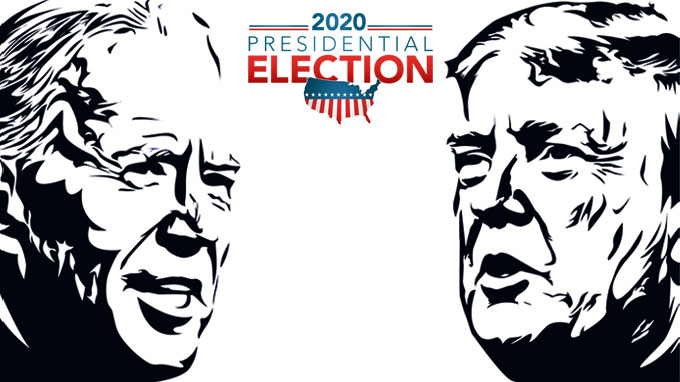Corporate America Weighing Its Options, Drifting Towards Biden
It’s the elephant in the room, quite literally, that most CEOs would prefer to quietly sulk in the far corner rather than upset their rickety apple cart, already wobbling under the strain of the Corona Pandemic. Just about the last thing corporate America needs is for the Republican Party to mobilize ‘lawyers, guns, and money’ to contest the outcome of tomorrow’s vote.

Though traditionally a big tent (tepee?) party just as their Democrat cousin/nemesis, the Republican split between its blue collar, flag waving, bible thumping, and gun toting constituency and the well-heeled, urban, pragmatic, and sophisticated element contains the seed of serious discord, if not a clash of interests.
Perhaps president Donald Trump’s greatest accomplishment was to keep the two factions firmly in the red tent. He not just pandered to both but delivered the goods as well: The MAGA crowd got a few miles of border wall, a small tax cut, and frequent nods of approval whilst the urbanites were showered with a stock market bonanza, a slashing of annoying red tape, and major reductions to their tax liabilities.
Still, the president’s incessant stoking of controversy, his undignified tweeting of quasi vulgarities, and his embarrassing self-aggrandisement has the more cosmopolitan Republican wing worried that their party may have been hijacked by the demographic branded ‘deplorable’ by Hillary Clinton four years ago – a touché moment that may well have cleared the way to the White House for her opponent.
Awkward Honeymoon
The Party of Business never embraced Trump the way with the same excitement the Party of Power did. Invited to join the administration’s advisory councils, most CEOs bit their lips in the idle hope that their sage words might have a mildly benevolent impact. That awkward honeymoon lasted for about a year after which a trickle of desertions turned into a stampede by CEOs anxious, if not desperate, to mitigate the risk of being associated with a possibly bigoted president.
Wal-Mart CEO Doug McMillon rebuked the president for his monumentally inept handling of the August 2017 Charlottesville Incident where a nazi-sympathiser rammed his vehicle into a crowd of protesters, killing one and wounding several others. President Trump refused to condemn the attack, instead decrying the violence ‘on many sides’ before muttering ‘racism is evil’ – only to revert a day later by loudly wondering why the counter-protesters came ‘armed with clubs’ to the Unite the Right rally organised by assorted groups of racists, latter-day confederates, neo-nazis, and doomsday private militias.
Mr McMillon immediately distanced himself and his company from this public relations disaster by reminding Mr Trump that he missed a ‘critical opportunity’ to help bring the country together by ‘unequivocally’ rejecting white supremacism.
After ‘Charlottesville’, corporate luminaries such as Bob Iger (Disney), Elon Musk (Tesla), Brian Krzanich (Intel), and Ken Frazier (Merck), amongst many others, couldn’t get to the exit fast enough, prompting the hapless president to quickly disband his Strategic and Policy Forum in an attempt to save face. Predictably, the ‘deplorables’ cheered ever so loud: Who needs experts when you have genius in charge?
Problems for Solutions
A poll commissioned by Yale University amongst CEOs of major corporations shows that 77 percent plan to vote for Joe Biden. However, a UBS survey of entrepreneurs found that some 55 percent favour Mr Trump. The reason most often given is the present administration’s rollback of cumbersome regulation. The 2017 corporate tax cut was also appreciated. Yet, CEOs of large companies were jarred by Mr Trump’s insistence on looking for problems to fit his solutions. The estranging of trading partners from Europe to China and the tightening of restrictions on skilled immigration have not played well in boardrooms.
“There’s a lot more to having a favourable business climate than just having a lower tax rate,” says Sarah Bonk of Business for America, a partnership of companies working towards better government. Ms Bonk explains that CEOs resent Trump for forcing them to speak out on issues they’d rather ignore such as racism, foreign policy, and climate change: “Most CEOs don’t want to think about politics and would like government to just get on with tackling whatever societal issues demand attention.” Business leaders, she emphasises, need predictability but instead see a failure of government to solve big problems. Ms Bonk agrees that said failure predates the Trump Administration though the increased polarisation in Washington adds to the gridlock and is having ‘tangible negative consequences’.
The US Chamber of Commerce is unhappy as well and irked by partisan tug of war that prevented the release of a third fiscal stimulus package to offer succour to businesses and families affected by the pandemic. The chamber, a conservative bastion, has inched towards the centre and endorsed a record 30 Democrats for the House of Representatives, instead of the token handful, whilst still sanctioning no less than 192 Republican hopefuls.
Corporate Endorsements
Mr Trump received 15 public endorsements from CEOs of companies included in the S&P 500 large-cap index though MarketWatch tabulated twice that number for Mr Biden. Remarkably, former News Corp CEO James Murdoch, son of the disruptive and über-conservative Australian media mogul, has given the Democrat frontrunner his blessing. In July, Mr Murdoch resigned from the News Corp board of directors citing disagreements over its editorial line.
Even as Mr Biden handsomely outpaced Mr Trump in raising cash for his campaign, pundits warn against reading too much into this: Most execs lavishly fund whichever party happens to lead the polls – effectively buying access to the next president – whilst hedging their bets against an election day upset by shovelling a bit of cash to the underdog as well.
Whilst analysts at Moody’s and Goldman Sachs agree that a Biden Administration offers better prospects for sustained economic growth, research by PwC and UBS uncovered rising levels of anxiety amongst CEOs. In particular, the imminent end to the ultra-low tax Trump Era has corporations concerned as do Democrat promises on healthcare reform, environmental regulation, and checks on the sprawl of Big Tech.
Some business leaders also fear the end of their exuberant – if not magical – stock market ride which has, of late, helped to cloak dismal and inferior corporate performance, and sponsored a major disconnect between Wall Street and the real economy as played out on Mean Street.
Yet, the ‘other side’ offers a likewise unattractive palette of possibilities ranging from a mismanaged public health emergency to trade wars and a further alienation of global partners and allies.
However, corporate America is perhaps most vexed by the possibility of a president clinging to power beyond his sell-by date and the tsunami of uncertainty and risk such an electoral stalemate would deliver, up to and including civil unrest. That is most decidedly not good for business.
You may have an interest in also reading…
Kristalina Georgieva, CEO of the World Bank: Empowering Communities
Worldwide, around 500 million people live in “fragile situations,” mostly caused by armed conflict. Climate change threatens to add another
From Greece to Canada – George Delaportas: Big Dreams Need Big Country
George Delaportas is writing a new language and needs four years of research, and about EUR 80,000, to compile its
Europe Drifts Away as its US Bogeyman Prepares to Leave
Tired of dancing to an American tune, the European Commission is ready to challenge the global supremacy of the US


















































































